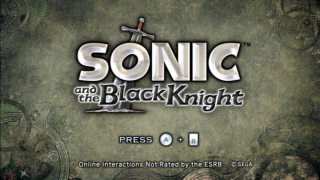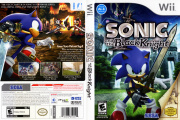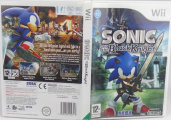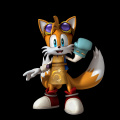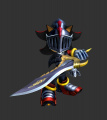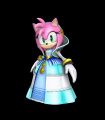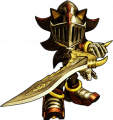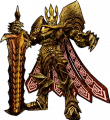Difference between revisions of "Sonic and the Black Knight"
From Sonic Retro
(→Artwork) |
|||
| (11 intermediate revisions by 8 users not shown) | |||
| Line 1: | Line 1: | ||
{{Bob | {{Bob | ||
| − | | bobscreen=Satbk | + | | bobscreen=Satbk titlescreen.png |
| screenwidth=320 | | screenwidth=320 | ||
| publisher=[[Sega]] | | publisher=[[Sega]] | ||
| Line 9: | Line 9: | ||
| japan=March 12, 2009 | | japan=March 12, 2009 | ||
| australia=March 31, 2009 | | australia=March 31, 2009 | ||
| − | | genre=Action | + | | rrp_jp=6,800 |
| + | | genre=Action | ||
| esrb=e10|pegi=12|cero=a|usk=12|oflc=pg | | esrb=e10|pegi=12|cero=a|usk=12|oflc=pg | ||
}} | }} | ||
| − | + | '''Sonic and the Black Knight''', called '''''Sonic to Ankoku no Kishi''''' (ソニックと暗黒の騎士) in Japan, is a title within the ''[[Sonic the Hedgehog]]'' series, released exclusively on [[Nintendo Wii]] as the second entry in the Storybook series, following ''[[Sonic and the Secret Rings]]''. | |
| − | Set in the world of King Arthur, the game combines Sonic's trademark speed with a new swordfighting system, making use of the Wii Remote's motion-sensing functionality. | + | Set in the [[Grand Kingdom|world of King Arthur]], the game combines Sonic's trademark speed with a new swordfighting system, making use of the Wii Remote's motion-sensing functionality. |
==Plot== | ==Plot== | ||
| Line 30: | Line 31: | ||
The stages will feature civilians that the player can choose to help or smite; these actions and the player's deeds will be judged at the end of each stage, updating the player's "knight ranking" accordingly. By helping out citizens, players will be able to purchase new items from them, such as gauntlets, magical tomes, and new swords. There will be about 200 items in the game, some of which can be gained by opening treasure chests in the stages. An online mode will allow treasures to be traded. | The stages will feature civilians that the player can choose to help or smite; these actions and the player's deeds will be judged at the end of each stage, updating the player's "knight ranking" accordingly. By helping out citizens, players will be able to purchase new items from them, such as gauntlets, magical tomes, and new swords. There will be about 200 items in the game, some of which can be gained by opening treasure chests in the stages. An online mode will allow treasures to be traded. | ||
| − | The game changes the traditional level items, such as springs and speed pads, into "elements". These elements come in varying colors; | + | The game changes the traditional level items, such as springs and speed pads, into "elements". These elements come in varying colors; blue elements will be used as springs, blue elements will be used as speed boosts, and red elements will be used to fill up the "[[Soul Gauge]]". This gauge is filled by defeating enemies and collecting red fairies, and is used to unleash a speed boost that, when reaching enemies, will inflict a powerful ombination attack, [[Soul Surge]]. Additionally, instead of rails from previous games, players will fire a ballista and then grind across its rope. |
The mission-based system from ''Sonic and the Secret Rings'' will also return, but the missions will be easier to complete. Each stage will consist of multiple missions which feature different stipulations. The skill system from the aforementioned game also returns, but will be reviewed to adjust any problems that were present in that game; the skill system is also being designed so as not to interfere with the game's tempo. | The mission-based system from ''Sonic and the Secret Rings'' will also return, but the missions will be easier to complete. Each stage will consist of multiple missions which feature different stipulations. The skill system from the aforementioned game also returns, but will be reviewed to adjust any problems that were present in that game; the skill system is also being designed so as not to interfere with the game's tempo. | ||
| Line 36: | Line 37: | ||
==Music== | ==Music== | ||
| − | Veteran composer [[Jun Senoue]] returned to compose music for this installment, mixing familiar Sonic themes with a Celtic style. | + | Veteran composer [[Jun Senoue]] returned to compose music for this installment, mixing familiar Sonic themes with a Celtic style. In addition, his band, [[Crush 40]], has returned to perform the main theme of the game, "Knight of the Wind" (As heard in the [[Tokyo Game Show]] trailer.), as well as three additional songs. [[Tommy Tallarico]] had the game listed on his website as one of the games he has worked on. Finally, [[Richard Jacques]] made the music for the cutscenes, as previously confirmed by Official Nintendo Magazine. |
| − | + | ==Production Credits== | |
| − | + | For a complete list of the games production credits please click the following link: [[Sonic and the Black Knight credits]] | |
| − | |||
| − | |||
| − | |||
| − | |||
| − | |||
| − | |||
| − | |||
| − | |||
| − | |||
| − | |||
| − | |||
| − | |||
| − | |||
| − | |||
| − | |||
| − | |||
| − | |||
| − | |||
| − | |||
| − | |||
| − | |||
| − | |||
| − | |||
| − | |||
| − | |||
| − | |||
| − | |||
| − | |||
| − | |||
| − | |||
| − | |||
| − | |||
| − | |||
| − | |||
| − | |||
| − | |||
| − | |||
| − | |||
| − | |||
| − | |||
| − | |||
| − | |||
| − | |||
| − | |||
| − | |||
| − | |||
| − | |||
| − | |||
| − | |||
| − | |||
| − | |||
| − | |||
| − | |||
| − | |||
| − | |||
| − | |||
| − | |||
| − | |||
| − | |||
| − | |||
| − | |||
| − | |||
| − | |||
| − | |||
| − | |||
| − | |||
| − | |||
| − | |||
| − | |||
| − | |||
| − | |||
| − | |||
| − | |||
| − | |||
| − | |||
| − | |||
| − | |||
| − | |||
| − | |||
| − | |||
| − | |||
| − | |||
| − | |||
| − | |||
| − | |||
| − | |||
| − | |||
| − | |||
| − | |||
| − | |||
| − | |||
| − | |||
| − | |||
| − | |||
| − | |||
| − | |||
| − | |||
| − | |||
| − | |||
| − | |||
| − | |||
| − | |||
| − | |||
| − | |||
| − | |||
| − | |||
| − | |||
| − | |||
| − | |||
| − | |||
| − | |||
| − | |||
| − | |||
| − | |||
| − | |||
| − | |||
| − | |||
| − | |||
| − | |||
| − | |||
| − | |||
| − | |||
| − | |||
| − | |||
| − | |||
| − | |||
| − | |||
| − | |||
| − | |||
| − | |||
| − | |||
| − | |||
| − | |||
| − | |||
| − | |||
| − | |||
| − | |||
| − | |||
| − | |||
| − | |||
| − | |||
| − | |||
| − | |||
| − | |||
| − | |||
| − | |||
| − | |||
| − | |||
| − | |||
| − | |||
| − | |||
| − | |||
| − | |||
==Resources== | ==Resources== | ||
| − | ===Scans=== | + | ===Physical Scans=== |
| − | + | {{Scanbox | |
| − | + | | console=Wii | |
| − | + | | region=US | |
| − | + | | front=Black knight storybook box US.jpg | |
| − | + | | disc=SatBK_US_Disc.jpg | |
| − | + | | manual= | |
| − | + | }}{{Scanbox | |
| − | + | | console=Wii | |
| − | + | | region=EU | |
| − | + | | front=Satbk wii eu cover.jpg | |
| − | + | | disc= | |
| − | + | | manual= | |
| − | + | }}{{Scanbox | |
| − | + | | console=Wii | |
| − | + | | region=JP | |
| − | + | | front=Satbk wii jp cover.png | |
| − | + | | back=Satbk wii jp cover back.jpg | |
| − | + | | spinemissing=yes | |
| + | | disc= | ||
| + | | manual= | ||
| + | }}{{Scanbox | ||
| + | | console=Wii | ||
| + | | region=AU | ||
| + | | front=Black Knight box AUS.jpg | ||
| + | | disc= | ||
| + | | manual= | ||
| + | }}{{Scanbox | ||
| + | | console=Wii | ||
| + | | region=ES | ||
| + | | front=Black Knight box Spain.jpg | ||
| + | | disc= | ||
| + | | manual= | ||
| + | }}{{Scanbox | ||
| + | | console=Wii | ||
| + | | region=DE | ||
| + | | front=Black Knight box Germany.jpg | ||
| + | | disc= | ||
| + | | manual= | ||
| + | }} | ||
===Artwork=== | ===Artwork=== | ||
| Line 236: | Line 105: | ||
==Trivia== | ==Trivia== | ||
| − | *Besides [[Tails]]' [[Tails Skypatrol|solo]] [[Tails Adventures|outings]], this is the only non-pirated Sonic game where [[Dr. Robotnik]] | + | *Besides [[Tails]]' [[Tails Skypatrol|solo]] [[Tails Adventures|outings]], this is the only non-pirated Sonic game where [[Dr. Robotnik]] (or his [[King Shahryār|counterparts]]) make no appearance whatsoever, aside from pieces of fan art that were featured in the game. |
*[[Caliburn]], the sword Sonic wields in the game, is in fact the fabled Sword in the Stone. According to the legend, whomever drew Caliburn from the anvil it was embedded in would be crowned King of England. | *[[Caliburn]], the sword Sonic wields in the game, is in fact the fabled Sword in the Stone. According to the legend, whomever drew Caliburn from the anvil it was embedded in would be crowned King of England. | ||
| + | *The game, in all its regional variations, features an option to switch between both English and Japanese voice language. | ||
==External links== | ==External links== | ||
| Line 243: | Line 113: | ||
* [http://www.sega.com/sonicblackknight/us/index.html Official US Site] | * [http://www.sega.com/sonicblackknight/us/index.html Official US Site] | ||
* [http://sonic.sega.jp/ankokunokishi/ Official Jap Site] | * [http://sonic.sega.jp/ankokunokishi/ Official Jap Site] | ||
| + | * [http://sega.jp/wii/sonicak/ Sega of Japan catalogue page] | ||
* [http://www.gamefaqs.com/console/wii/game/951327.html SatBK at GameFAQs] - Including detailed walkthroughs and a comprehensive guide to items. | * [http://www.gamefaqs.com/console/wii/game/951327.html SatBK at GameFAQs] - Including detailed walkthroughs and a comprehensive guide to items. | ||
| − | {{ | + | {{SonicBlackKnightOmni}} |
{{SonicWiigames}} | {{SonicWiigames}} | ||
| − | [[Category:Wii | + | [[Category:Wii games]] |
Revision as of 15:09, 24 September 2011
| Sonic and the Black Knight |
|---|
| System(s): Nintendo Wii |
| Publisher: Sega |
| Developer: Sonic Team |
| Genre: Action |
Sonic and the Black Knight, called Sonic to Ankoku no Kishi (ソニックと暗黒の騎士) in Japan, is a title within the Sonic the Hedgehog series, released exclusively on Nintendo Wii as the second entry in the Storybook series, following Sonic and the Secret Rings.
Set in the world of King Arthur, the game combines Sonic's trademark speed with a new swordfighting system, making use of the Wii Remote's motion-sensing functionality.
Contents
Plot
The game begins in the story "King Arthur and the Knights Of The Round Table" when the granddaughter of the legendary Merlin, Merlina, is trying to escape pursuit from a mysterious evil band of knights. Seeing no escape, she summons out a Chosen Hero to save her. This ends up being Sonic the Hedgehog, and, after a sloppy entering, easily dispatches most of the evil creatures. When preparing to face off the Big One, he is pulled back by Merlina and warped to another location. When Sonic asks why she stopped him and who that guy was, Merlina explains that it was King Arthur who, after being corrupted by the power of the Scabbard of Excalibur , transformed into The Black Knight, turning his own blade into Deathcalibur and nefariously rules the world. Sonic's speed alone will not put an end to The Black Knight's reign, so he must take on a talking, "ancient" sword known as Caliburn. After facing King Arthur another time and fails to defeat him, Sonic must prove himself as a knight and in order to do that, he must get help from the Local Blacksmith (portrayed by Tails), complete tasks from Nimue, Lady of the Lake (portrayed by Amy), and defeat King Arthur's Knights Of The Round Table: Sir Lancelot (portrayed by Shadow the Hedgehog), Sir Gawain portrayed by (Knuckles the Echidna), and Sir Percival (portrayed by Blaze the Cat).
After overthrowing all of the Knights Of The Round Table and obtaining their Sacred Swords, Sonic confronts King Arthur in Avalon for a final confrontation. With the power of the Sacred Swords, Sonic overcomes Arthur's immortality and finally defeats him. Once defeated, the King disappears in a puff of smoke, leaving behind his scabbard. He then meets up with Merlina and the Knights Of The Round Table, where Merlina reveals that King Arthur was an illusion conjured by her grandfather Merlin. Merlina then takes King Arthur's scabbard and reveals her true intentions: to make the Kingdom eternal. After escaping the Kingdom, Sonic and the Knights Of The Round Table set off to find the Barrier Stones in order to create a barrier that is supposed to stop Merlina. Before the barrier is created, Sonic confronts Merlina about why she is doing this but. Sonic still refuses to give up and challenges her, only to be beaten mercilessly with Caliburn being severed in the process. Despite the barrier being released, it isn't powerful enough to stop Merlina. All hope seems lost, but the Sacred Swords, along with Sonic's courage, revives and transforms Caliburn into Excalibur, turning Sonic into a Golden Knight. Excalibur Sonic battles the Dark Queen in the final showdown and Sonic is victorious with the power of the Excalibur Blade. After the battle, Sonic confronts and comforts Merlina, telling her to live life to the fullest. The Knights Of The Round Table arrive and with King Arthur no more, they prepare to disband. Caliburn, however, decides otherwise and reveals that the true King Arthur is in fact Sonic.
After the credits roll, it seems that Sonic told this tale to Amy as an excuse for leaving her behind. Amy, though, doesn't believe it and it is implied that she went chasing Sonic with her Piko-Piko Hammer. As this happens, the book "King Arthur and the Knights Of The Round Table" turns into "Sonic and the Black Knight".
Gameplay
Gameplay for Sonic and the Black Knight differs from traditional games in the Sonic series by mixing in the new element of swordplay, along with the traditional Sonic platforming and speed. Swordplay is implemented through the Wii Remote. Gameplay will be more similar to Sonic Unleashed than Sonic and the Secret Rings; Sonic's movement will be controlled with the analog stick, and gameplay will mainly be 3D, but occasionally the camera will shift to a side-scrolling perspective for traditional 2D gameplay.
Swordplay will be implemented so that players can slice through enemies without slowing down, but when faced with more formidable enemies, players will engage in advanced swordplay, able to thrust, parry, and perform other maneuvers. The sword will not be used just for combat; players may thrust it through a wall while falling to slow their descent.
The stages will feature civilians that the player can choose to help or smite; these actions and the player's deeds will be judged at the end of each stage, updating the player's "knight ranking" accordingly. By helping out citizens, players will be able to purchase new items from them, such as gauntlets, magical tomes, and new swords. There will be about 200 items in the game, some of which can be gained by opening treasure chests in the stages. An online mode will allow treasures to be traded.
The game changes the traditional level items, such as springs and speed pads, into "elements". These elements come in varying colors; blue elements will be used as springs, blue elements will be used as speed boosts, and red elements will be used to fill up the "Soul Gauge". This gauge is filled by defeating enemies and collecting red fairies, and is used to unleash a speed boost that, when reaching enemies, will inflict a powerful ombination attack, Soul Surge. Additionally, instead of rails from previous games, players will fire a ballista and then grind across its rope.
The mission-based system from Sonic and the Secret Rings will also return, but the missions will be easier to complete. Each stage will consist of multiple missions which feature different stipulations. The skill system from the aforementioned game also returns, but will be reviewed to adjust any problems that were present in that game; the skill system is also being designed so as not to interfere with the game's tempo.
Music
Veteran composer Jun Senoue returned to compose music for this installment, mixing familiar Sonic themes with a Celtic style. In addition, his band, Crush 40, has returned to perform the main theme of the game, "Knight of the Wind" (As heard in the Tokyo Game Show trailer.), as well as three additional songs. Tommy Tallarico had the game listed on his website as one of the games he has worked on. Finally, Richard Jacques made the music for the cutscenes, as previously confirmed by Official Nintendo Magazine.
Production Credits
For a complete list of the games production credits please click the following link: Sonic and the Black Knight credits
Resources
Physical Scans
| Wii, JP |
|---|
<div style="margin:auto; max-width:Expression error: Unexpected < operator.px">
 Cover
|
Artwork
Trivia
- Besides Tails' solo outings, this is the only non-pirated Sonic game where Dr. Robotnik (or his counterparts) make no appearance whatsoever, aside from pieces of fan art that were featured in the game.
- Caliburn, the sword Sonic wields in the game, is in fact the fabled Sword in the Stone. According to the legend, whomever drew Caliburn from the anvil it was embedded in would be crowned King of England.
- The game, in all its regional variations, features an option to switch between both English and Japanese voice language.
External links
- Official US Site
- Official Jap Site
- Sega of Japan catalogue page
- SatBK at GameFAQs - Including detailed walkthroughs and a comprehensive guide to items.
| Sonic and the Black Knight | |
|---|---|
|
Promotional material |
show;hide
|
| Sonic the Hedgehog games for the following systems | |
|---|---|
| 2007 Sonic and the Secret Rings | Mario & Sonic at the Olympic Games 2008 Sonic Riders: Zero Gravity | Sonic Unleashed 2009 Sonic and the Black Knight | Mario & Sonic at the Olympic Winter Games | Sega Fun Pack: Sonic and the Secret Rings & Super Monkey Ball Banana Blitz 2010 Sonic & Sega All-Stars Racing | Sonic Colours 2011 Mario & Sonic at the London 2012 Olympic Games | |
